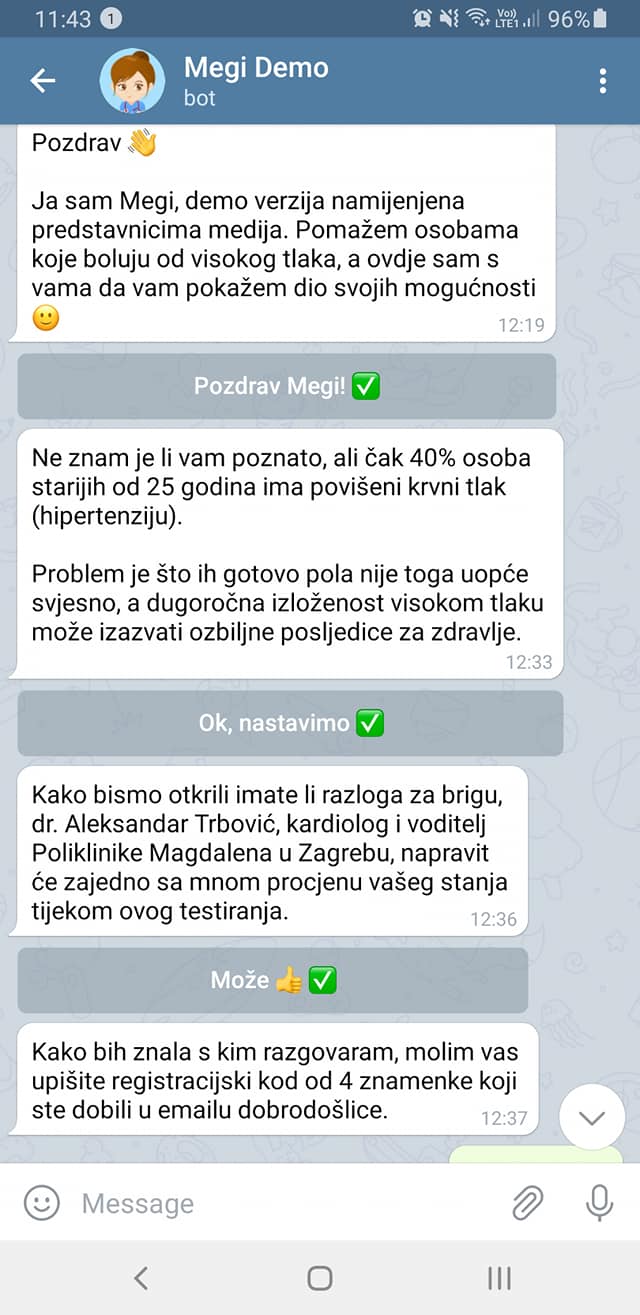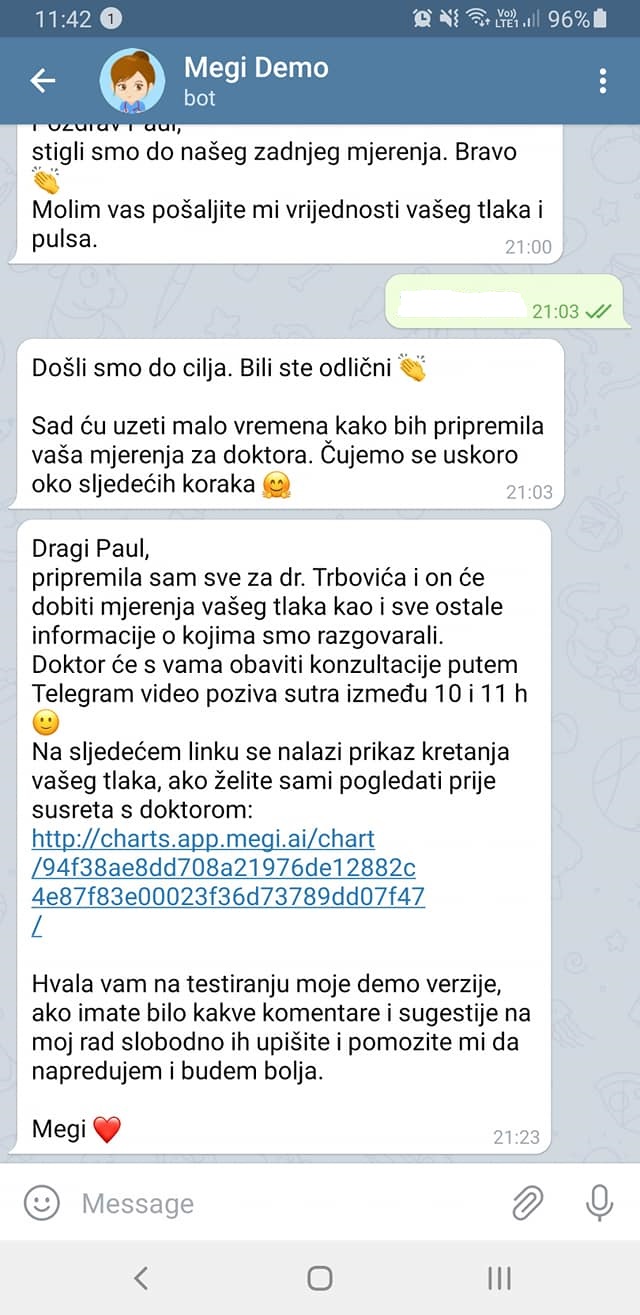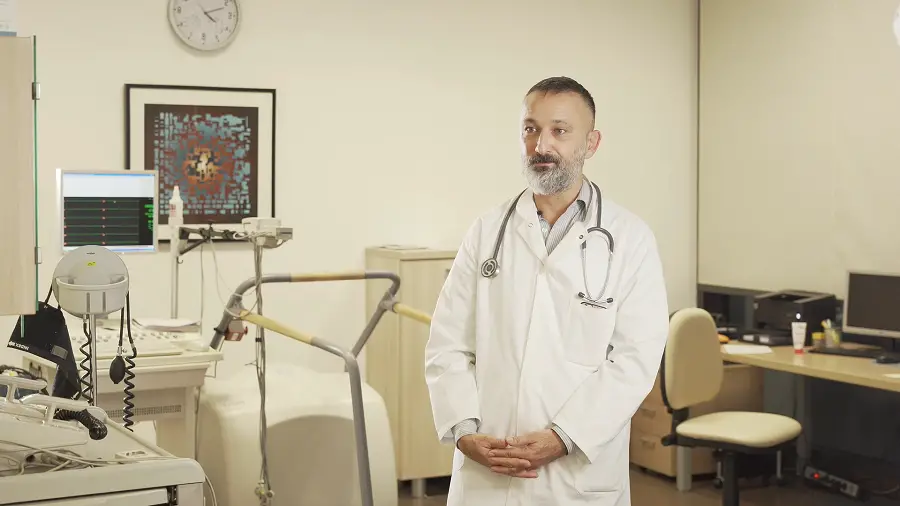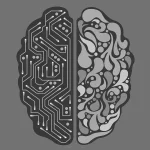December 11, 2020 – The AI revolution is upon us. TCN roadtests Megi, an AI healthcare assistant tackling issues such as hypertension.
I can’t deny that my inbox is a fascinating place.
With all the abuse, occasional death threats, and general advice on how I could do a much better job, there are the occasional invitations. Events, restaurants, hotels, destinations – that kind of thing. The majority of them are tourism-related, but last week I received an invitation of an altogether different kind.
I hadn’t left the house for a week, and the prospect of being able to do all this without leaving the sofa had a certain appeal. It was a little ironic, I mused, healthcare of the future delivered to your sofa without the need to exercise…
And while it was flattering to be called a ‘VIP journalist’, I suspect the reason that I was selected had more to do with my legendary pink skin and the possible blood pressure issues that might be contained therein.
I am naturally averse to visiting doctors, but it couldn’t hurt to have my blood pressure checked and have a consultation with a specialist, especially if I didn’t have to leave my couch. And anyway, I like being associated with those CRO AI guys – they make me feel young and a lot cooler than I am.
And I was curious.
The monitor arrived the next day (I had to get off the sofa for that bit). Apart from unpacking that, my only other chore was to find Megi on the Telegram app and insert my 4-digit code.

There followed a very friendly (much friendlier than my average medical surgery experience in Croatia) exchange with Megi, who explained that they were going to monitor and measure my blood pressure before making a video consultation available to me 3 days later. I simply had to answer some basic questions, choose five separate measuring times for my blood pressure the following day, then let Megi do the rest.
Our next communication was at 7am the next morning, the time of my first measurement. I checked the blood pressure and entered the numbers into the bot. Four hours later, another message, and we repeated the exercise until all 5 measurements were completed.

Megi then put the results into a helpful chart with some feedback and gave me my online appointment time for the following day. Between 10 and 11, on my sofa. SO much more convenient than the doctor’s surgery and the endless wait (and let’s not talk about the corona factor).

And I did not have long to wait. At 10:04, my Telegram app started ringing and I was introduced to cardiologist Dr. Aleksandar Trbovic, who took a look at my readings, asked me some questions and dispensed some very useful advice. I am sure that I am not the most complicated case he dealt with that day, but apart from the comfort of knowing there were no serious problems (although there are things to work on), what a total transformation in the traditional healthcare experience. The consultation lasted just 4 minutes. It would have been longer if I had had additional questions.
Has the experience affected me at all? Well, I have been thinking a little about it, and after this blog, I will give up my sofa briefly to take in the minimum 10,000 daily steps that have become my new routine thanks to the caring advice of Megi.
A novel experience for me, and this is I am sure just the start of an incredible journey for the minds behind Megi, one which we look forward to following at TCN. Below you can find much more detailed information from the official press release.
I just hope I don’t lose my pinkness.
PRESS RELEASE
Mindsmiths Unveiled Megi – An AI Prototype in Healthcare
- Magdalena Clinic for Cardiovascular Diseases and Mindsmiths unveiled the results of an AI prototype with application in healthcare – digital assistant Megi
- For 12 months, Megi was integrated into an actual healthcare system and managed more than 80 real patients suffering from hypertension, ie high blood pressure
- By 2050, 40% of the EU population will have one or more chronic diseases, and hypertension currently affects 1.13 billion people worldwide
- Months of research and testing of Megi show that the time required to adjust the therapy of a hypertension patient can be shortened from 6 months to 3 weeks
Zagreb, December 8, 2020 – Mindsmiths, an AI startup known as a co-founder of CroAI and one of the companies that donated digital assistant Andrija to the Croatian Ministry of Health, presented the results of its AI prototype in healthcare in Zagreb today.
The digital assistant called Megi, developed in collaboration with the Magdalena Clinic, can use artificial intelligence to scale the knowledge of medical experts and thus improve the health system and take care of chronic patients. Over the past 12 months, Megi has been integrated into an actual hospital system and managed more than 80 chronic patients suffering from hypertension, ie high blood pressure.
The problem of chronic diseases in the EU
High blood pressure or hypertension is a serious disease that affects 1.13 billion people worldwide. Less than 20% of patients with hypertension successfully regulate blood pressure. “Hypertension, together with other chronic diseases, is the biggest burden on the health system, and during a pandemic, chronic patients are the most affected because they are denied standard access to the health system. Research shows that by 2050, at least 40% of the EU population will have one or more chronic diseases.” said the director of digital health at the Magdalena Clinic, Nina Šesto, explaining the obvious need to develop a solution for the global problem of chronic diseases.
Who Megi is and how she came to be
Maggie is a digital brain modeled on the knowledge of experts, primarily cardiologists and nurses in the field of cardiology. Its initial development took 6 months before it was put in direct contact with patients and doctors. Since then, she has been in daily contact with more than 80 patients for 12 months. The people at Mindsmiths claim that Megi is a perfect example of what the startup does, and that is the democratization of knowledge.
Mislav Malenica, founder and CEO of the startup Mindsmiths: “The concept of the democratization of knowledge is one in which we copy the brain of an expert, make it help one person and eventually enable it to help thousands of people. We are trying to create systems that provide mentorship – that know what needs to be done in this moment but also know what is good for me in the long run.”
Mindsmiths makes the aforementioned digital brain accessible to users by adapting to their preferences and choice of interface, to enable effortless user interaction with artificial intelligence and to maximize technology adoption.
During the research phase that lasted several months, Mindsmiths experts found that most patients have significant challenges in the advanced use of their smartphones.
- Downloading and installing applications was an obstacle for the vast majority of test users due to not knowing their own username and password to access the AppStore or GooglePlay platforms.
- Most haven’t updated their smartphone software for more than a year.
- A significant proportion of users cannot access mobile websites due to data settings or couldn’t find an internet browsing app on their mobile device.
- A large proportion of users didn’t have enough free memory on their smartphone and didn’t know how to free it up without losing valuable data such as photos and videos of loved ones.
But on the other hand:
- Almost all users had a text messaging application like WhatsApp, Viber or Telegram installed and used it daily.
- Almost all users knew how to use SMS on their mobile device.
The patient communicates with Megi through text-based interfaces, via SMS or messaging apps since they present the lowest barrier to acceptance of the technology. Megi imitates the flow of conversation that the patient would have with a real nurse or doctor. She takes care of the patient by communicating proactively. Over time, it becomes clear to the patients that there’s no need to worry about the timing of their blood pressure measurements since Megi is the one reminding them, the patients don’t need to take notes of their current condition or memorize the time of their examination or whether to contact the doctor or not. Megi takes care of all of these things which allows the patient to live unencumbered and carefree.
Patients who have been using Megi for the past 12 months have experienced a complete change in the way they see their chronic illness and the incredible ease of communication with Megi that they perceive as a real person.
Stipe Knezović (62), a patient suffering from hypertension, has been using Megi for 7 months and when asked what Megi is like, he readily answers: “Megi is kind and above all – Megi has a calming effect. Megi never talks in imperative, every request starts with ‘please do this, measure your pressure, write down your data, send your information…’ In that sense it feels like talking to a person, like a pleasant conversation with a pleasant person.”
Mirjana Lacković (67) has been suffering from high blood pressure for more than a decade. She was the first patient of Megi, they have been in contact for 13 months: “Megi is very caring and kind. If my blood pressure isn’t regulated, she contacts me via messages until my condition normalizes. If it’s bad for a couple of days, and it’s not surprising for it to be so, she contacts the doctors.”
They admit that it’s difficult to explain to others who this new person they’re talking to is.
What the lives of chronic patients look like
The life of a chronic patient suffering from hypertension requires great discipline and consistency in taking care of one’s own health. In addition to taking constant blood pressure measurements and monitoring their condition, they often have to take regular drug therapy, which often consists of different medications that each must be taken at different times of the day. Going to the doctor often requires significant effort and can cause certain psychological stress.
Patients suffering from hypertension have to go through multiple ‘stations’ within the health system in order to receive satisfactory care. Such a process involves collecting referrals from the family doctor, long waiting lists, and concerns about one’s own health in anticipation of specialist examinations. The multitude of paperwork that is collected in such procedures and that can often be lost is most often the responsibility of the patient herself or himself, from the diary consisting of blood pressure measurements to diagnostic findings. Patients often feel left out in many ways and most of the time.
Artificial intelligence in healthcare
In today’s situation when the health system is running out of energy not only due to the new epidemiological situation but also the lack of medical staff, AI solutions are more than needed to maintain functional care for patients.
Aleksandar Trbović, MD, cardiologist from the Magdalena Clinic: “Megi helps me gather all relevant information about the patient. I have all the blood pressure values, I can see trends and patterns in data, how the pressure moves with certain time periods – through months, throughout the day; how the patient reacted to the change of medication, were there any complications of high blood pressure, did they have to contact the emergency department… So, the idea of all this is that I’m always updated and can look at the measurements at any time.”
Family physicians and primary care nurses take the greatest burden when it comes to treating chronic diseases, they are the first and most commonly available contact point for patients who need professional help. Digital assistant Megi can help maintain the doctor-patient relationship by informing the doctor about the patient’s current condition on the one hand, and guiding the patients through the process of taking care of themselves without the need for medical intervention.
AI prototype Megi has recently become part of the process of treating patients with hypertension at the Health Center in Zagreb. At this public health facility, Maggie is integrated into the process of treating chronic patients by a family doctor. There, Dr. Romić takes care of 8 hypertensives together with Maggie.
Renata Romić, MD, family physician at the Health Center Zagreb: “One of the great advantages of Megi is her default availability, she is at my fingertips at all times. During moments of strong jumps in blood pressure, she is their first contact for patients that calmly tells them what to do so their pressure doesn’t rise even further due to fear, and she offers us a detailed overview of blood pressure measurements so that patients and I can come to common conclusions about the needed therapy without additional diagnostic tests or check-ups by medical specialists in hospitals. We think of Megi as our best friend.”
Antonija Balenović, MD, PhD and Assistant Professor is the director of the Health Center Zagreb, the first community health institution to join the project. She claims that it’s important for doctors to look positively at innovations in healthcare:
“Our family doctors also play a big role here, recognizing the importance and support of digital assistant Megi by presenting her purpose to the patients. And indeed, patients have realized how useful she is to them, they feel safer and continue their interactions with her. Megi is here to the mutual satisfaction of both doctors and patients.”
What are the measurable results of the application of the AI prototype Megi in healthcare?
Aleksandar Trbović, MD, a cardiologist from the Magdalena Clinic, after a year of applying the AI prototype in real conditions, he clearly sees how the application of artificial intelligence in healthcare brings multiple benefits. “The first advantage refers to the end user, ie the patient who fights his hypertension in a better way, in conditions outside of hospitals, ie at home. The patient is encouraged to take therapy daily. Megi is also useful for us doctors and to me as a cardiologist who treats patients because I have a tool with a lot of data that allows me to better treat hypertension. And the third thing we must not forget is the added value for the whole community in terms of reducing the cost of treating hypertension itself, but also of the possible complications.”
Mislav Malenica, founder and CEO of startup Mindsmiths, takes an engineering approach to the analysis of the one-year testing of Megi and points out that the number one problem with the health system is insufficient optimization: “We realized that the examination takes an average of 22 minutes, of which almost 15 minutes is spent with the doctor gathering information. With Megi, the time required to gather information is shortened from 15 minutes to 4 minutes. The time required to adjust the therapy can be shortened from 6 months to 3 weeks. If we would help doctors focus only on the patients who really need their help at that moment, we could relieve them of almost 80% of check-ups.”
A clinical trial of the Megi prototype has shown tremendous potential for the application of artificial intelligence in healthcare and a drastic increase in efficiency in the process of treating chronic patients. Such an impact on the operability and quality of healthcare is possible thanks to the perfect complementarity of human and artificial intelligence.
Nina Šesto, PhD, director of Digital Health at the Magdalena Clinic:
“As health system users, we’re not even aware of how much data could be collected at home. However, the problem is in deciding the sampling dynamics – at what point and at what frequency we should take the measurements, and ultimately who will interpret that data to make it clinically relevant. Well, that’s a task for Megi. Megi is the bridge between the patient and the health system that navigates the patient on how to take care of his chronic condition.”
Without the application of artificial intelligence, healthcare systems will become unsustainable
“Today’s health systems face two facts: the first is that the population is aging, by 2050 it is predicted that 50% of Europe’s population will be over 60 and this automatically means that 40% of the population will have one or more chronic diseases. The concept of a universally accessible health care system with so many patients is absolutely unsustainable. Not in terms of infrastructure, human resources, nor fiscally. And this issue is not specific to Croatia, but applies to all health systems in the world. Artificial intelligence is exactly the key to health system scalability, because only artificial intelligence can consistently take care of thousands of patients at the same time.” pointed out Nina Šesto, director of Digital Health at the Magdalena Clinic.
“I can understand that the most expensive medical equipment isn’t available everywhere in the world, but the idea that we can’t offer the best advice to everyone – that’s something we as a society cannot accept.” concluded Mislav Malenica, founder and CEO of the startup Mindsmiths.
See the full recording of the event above.
Video on the problem of hypertension.
Video about the digital assistant Megi.











